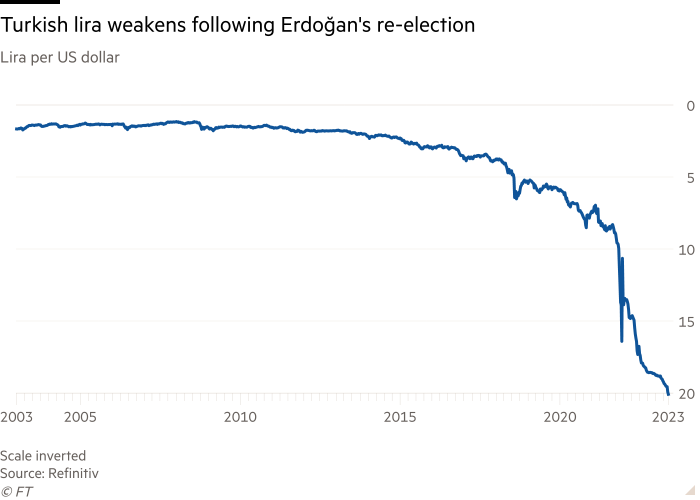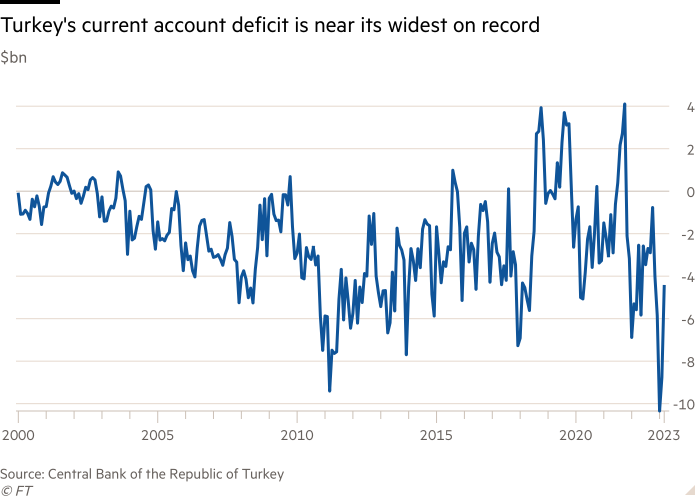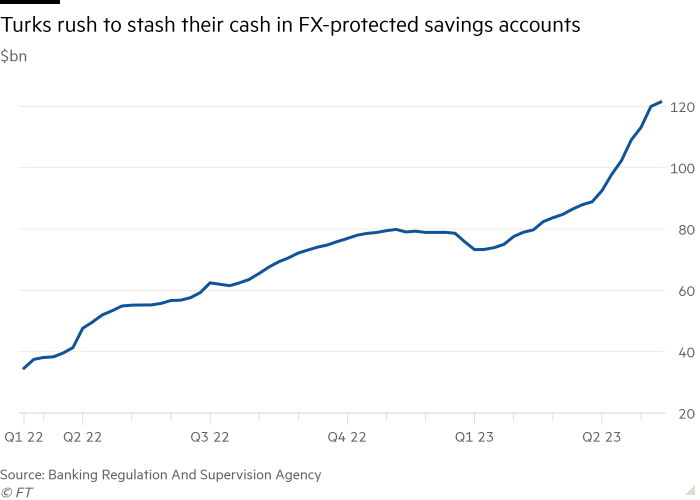The Turkish lira has weakened in the wake of Recep Tayyip Erdogan’s re-election, with analysts warning that the next big test for the victorious president will be to tackle the country’s shaky $900 billion economy.
Many economists argue that Erdogan’s policies of low interest rates and emergency measures to support the currency cannot be sustained with Turkey’s currency reserves rapidly declining.
The lira fell 0.6 percent to a record low of 20.2 against the US dollar as trading resumed in London, the main center for European currency trading, on Tuesday after a public holiday.
“The current political situation is becoming unsustainable,” said Liam Beach of Capital Economics in London. “Turkey cannot go on with very low interest rates, very loose fiscal policy, and burning all kinds of foreign exchange reserves for much longer.”
Turkey’s reserves have fallen by about $27 billion this year as the country has tried to prop up the lira and fund the current account deficit at near record levels.

Official data indicates that reserves, including foreign exchange and gold, are just above $101 billion.
However, net reserves, a number that excludes liabilities, is actually zero, which is highly negative when you exclude tens of billions of dollars in money borrowed from the domestic banking system, according to JPMorgan.
Reserves are now “close to levels when lira volatility sharply increased previously,” said Clemens Graf, an economist at Goldman Sachs in London.
But immediately after securing Sunday’s runoff victory of 52 percent, Erdogan insisted he would maintain his policy of low interest rates, even though inflation is currently over 40 percent.
He said, “If anyone can do it, I can do it.” “[The central bank’s main interest rate] It is now reduced to 8.5 percent and you will see that inflation will also go down.”
“Eliminating the problems of high prices caused by inflation and the loss of well-being are the most urgent topics of the coming days,” he added, without elaborating.

Investors are also worried about the equivalent of $121 billion that Turks have put into special savings accounts to be paid out at the government’s expense if the lira depreciates.
The measure slowed the rate at which Turks bought foreign currency, but Noureddine Nabati, the finance minister, said the accounts had cost the country about 95.3 billion Turkish liras ($4.7 billion) since it was introduced in 2021.
The damage to public finances could rapidly increase if the lira falls faster in the coming weeks.
However, analysts are of the opinion that Erdogan may be able to count on new funding from allies in the Middle East and Russia.
The president said last week that unnamed Gulf states had contributed funds to help stabilize Turkish markets, but he did not elaborate.

Wolf Piccoli of consulting firm Teneo said Erdogan will likely get a short-term boost from summer tourism revenues which tend to ease pressures on the country’s finances.
Turkey’s BEST 100 share index, boosted by locals seeking refuge from rising inflation, jumped more than 4 percent on Monday. It was generally raised due to rising inflation as domestic investors look for opportunities to generate returns that can compete with the rapid growth in consumer prices.
Some economists say Erdogan may appoint a new economic team, bringing back names well known to foreign investors.
“After the elections, all eyes will be on the makeup of the economic team and the credibility of the initial political response,” said Ilker Domak of Citigroup.
But Domak also warned that it would be an “increasing challenge” for Turkey’s central bank to keep interest rates well below inflation, “particularly during the last quarter of the year and beyond.”
Other economists have indicated a greater degree of anxiety.
“Be prepared for the worst, which could entail formal capital controls or a serious flight of deposits from the banking system,” wrote Atilla Yesilada of GlobalSource Partners, an advisory firm in Istanbul.

“Beer aficionado. Gamer. Alcohol fanatic. Evil food trailblazer. Avid bacon maven.”
